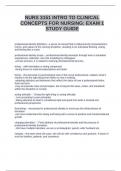NURS 3151 INTRO TO CLINICAL
CONCEPTS FOR NURSING: EXAM 1
STUDY GUIDE
professional identity definition - a sense of oneself that is influenced by characteristics,
norms, and values of the nursing discipline, resulting in an individual thinking, acting,
and feeling like a nurse.
professional identity scope - -professional identity develops through real or simulated
experiences, reflection, and role modeling by colleagues
-a linear process, it is related to learning developmental process
doing - -skill orientation or doing component
-strong focus on external expectations and tasks
being - -the personal or psychological view of the nurse professional, explains what it
means to do the right thing even when no one is looking.
-adopting attitudes and behaviors that reflect the value of how a professional thinks,
feels and acts
-may incorporate rules and principles, but is beyond the laws, codes, and standards
within the discipline or society
acting ethically - - Doing the right thing or acting ethically
- Live according to your principles
- Being attentive to what is considered right and good from both a societal and
professional perspective
flourishing - -necessary for professional identity to move pas the initial phases of
formation
-one must understand the doing and being with a sense of positive and transformational
growth
changing identities - - Final attribute of professional identity and the process of
professional identity formation.
- We have multiple identities; we are a son/daughter, parent, wife/ husband etc.
integrity - she does what she says, she will do with consistency and practice. A basis of
trust for families, patients, and coworkers
, compassion - feeling what another is feeling and responding with the intent of doing
something to help. with caring, they construe a sense of response and accompanying
action with those in need
courage - to affect change and to stand in opposition to moral righteousness. can be
characterized as physical or moral
humility - he or she views the world with equanimity, taking neither an overstated
amount of credit nor blame for the particular situation. Such as approach encourages a
realistic view of circumstances, events, and the actions of others
advocacy - the last line of defense on behalf of the patient. This normative conception is
an example of "signature image" of professional identity among nurses and other
professions
Benner Theory - remember that the term novice can apply to any nurse who is starting
in a new setting, for example, if I have experience working as a nurse in the ED and
then I must start in a new floor on which I have no experience, I will start as a novice
novice - Beginning nursing student or any nurse entering a situation in which there is no
previous level of experience (e.g., an experienced operating room nurse chooses to
now practice in home health). The learner learns via a specific set of rules or
procedures, which are usually stepwise and linear.
Advanced Beginner - A nurse who has had some level of experience with the situation.
This experience may be only observational in nature, but the nurse is able to identify
meaningful aspects or principles of nursing care.
competent - A nurse who has been in the same clinical position for 2 to 3 years. This
nurse understands the organization and specific care required by the type of patients
(e.g., surgical, oncology, or orthopedic patients). This nurse is a competent practitioner
who is able to anticipate nursing care and establish long-range goals. In this phase the
nurse has usually had experience with all types of psychomotor skills required by this
specific group of patients.
proficient - A nurse with more than 2 to 3 years of experience in the same clinical
position. This nurse perceives a patient's clinical situation as a whole, is able to assess
an entire situation, and can readily transfer knowledge gained from multiple previous
experiences to a situation. This nurse focuses on managing care as opposed to
managing and performing skills.
expert - A nurse with diverse experience who has an intuitive grasp of an existing or
potential clinical problem. This nurse is able to zero in on the problem and focus on
multiple dimensions of the situation. This nurse is skilled at identifying both patient-
centered problems and problems related to the health care system or perhaps the
needs of the novice nurse.




